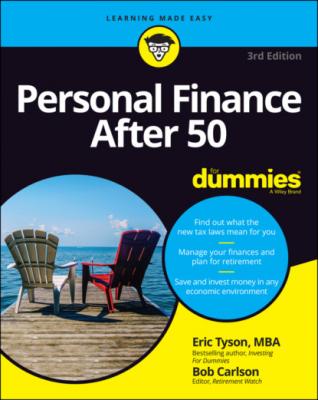Personal Finance After 50 For Dummies. Eric Tyson
Чтение книги онлайн.
Читать онлайн книгу Personal Finance After 50 For Dummies - Eric Tyson страница 16
 are only intended to provide for basic subsistence living expenses. Those earning more than $40,000 per year find that less than half of their income is replaced by Social Security disability payments. As Table 2-2 shows, the higher your income, the smaller the portion of your income will be replaced by Social Security disability.
are only intended to provide for basic subsistence living expenses. Those earning more than $40,000 per year find that less than half of their income is replaced by Social Security disability payments. As Table 2-2 shows, the higher your income, the smaller the portion of your income will be replaced by Social Security disability.
Worker’s compensation, if you have coverage through your employer, won’t pay benefits at all if you get injured or become sick away from your job. Such narrow coverage that only pays benefits under a limited set of circumstances isn’t the comprehensive disability insurance you need.
TABLE 2-2 The Portion of Your Income Being Replaced by Social Security Disability Benefits
| Annual Income | Social Security Disability Annual Benefit | Percent of Income Replaced by Social Security Disability |
|---|---|---|
| $20,000 | $13,080 | 65% |
| $30,000 | $16,280 | 54% |
| $40,000 | $19,480 | 49% |
| $50,000 | $22,680 | 45% |
| $75,000 | $29,730 | 40% |
| $100,000 | $33,480 | 33% |
| $150,000 | $36,130 | 24% |
| $200,000 | $36,130 | 18% |
| $400,000 | $36,130 | 9% |
Identifying needed disability coverage
Unless you’re already financially independent, you need long-term disability insurance during your working years. Generally speaking, you should have LTD coverage that provides a benefit of approximately 60 percent of your gross income. Because disability benefits payments are tax-free if you pay the premium for disability insurance you buy, they should replace your current after-tax earnings.
An “own occupation” definition of disability: This definition allows you to collect benefits if you can’t perform your regular occupation. For example, if you work as an accountant, your disability policy shouldn’t require you to take a job as a retail worker if you no longer can perform the duties of an accountant.
A noncancelable and guaranteed renewable clause: This clause guarantees that your policy can’t be canceled if you develop health problems. If you purchase a policy that requires periodic physical exams, you could lose your coverage when you’re most likely to need it.
A financially appropriate benefit period: Obtain a policy that pays benefits until an age at which you would become financially self-sufficient. For most people, that would require obtaining a policy that pays benefits to age 65 or 67 (when full Social Security retirement benefits begin).If you’re close to being financially independent and expect to accomplish that or retire before your mid-60s, consider a policy that pays benefits for five years.
A high deductible/waiting period: The waiting period is the “deductible” on disability insurance. It’s the time between your disability and when you can begin collecting benefits. We recommend that you take the longest waiting period that your financial circumstances allow, because doing so will greatly reduce your policy’s premiums. We generally recommend a waiting period of at least 90 or 180 days.
Residual benefits: This feature pays you a partial benefit if you have a disability that prevents you from working full time.
Cost-of-living adjustments: This provision automatically increases your benefit payment after you’re disabled by a set percentage or in step with inflation.
Shopping for disability coverage
After you understand the importance of having good disability insurance, hopefully you’ll be motivated to close the deal and buy it. Here are some ways to shop and compare so you end up with good coverage at a competitive price:
Check with your employer. Group disability plans can greatly accelerate your shopping process and generally offer decent value. Unlike with life insurance plans, group disability plans tend to offer more bang for your buck.
Peruse professional associations. For many self-employed people, if you find the associations that exist for your occupation or profession, you may well discover a fine disability plan. Just be sure to compare their offerings to whatever individual policy proposals you find.
Avail yourself of agents. Get referrals to insurance agents in your area who specialize in disability insurance. Using the policy guidelines in the preceding section, “Identifying needed disability coverage,” solicit and evaluate proposals.
FINDING A CAREER YOU LOVE
Most folks spend decades working. And getting caught up in the financial end of your career is easy and tempting. Of course, all other things being equal, you should earn more rather than less money! However, you should manage your career with an eye toward protecting and enhancing your earnings and your happiness.
We know folks who have been doing the same type of work for decades and love what they do. But they are the exception, not the norm.
A survey conducted by the Society for Human Resource Management found that when employees are younger (35 and under), their primary concerns are compensation and benefits. Older workers (over the age of 55) are more concerned with issues like job security, feeling safe at work, having the opportunity to use their skills and abilities, enjoying the work itself, and communication between employees and management. So, the financial aspects of work become less important for most workers as they get older.
Remember, you only live once.